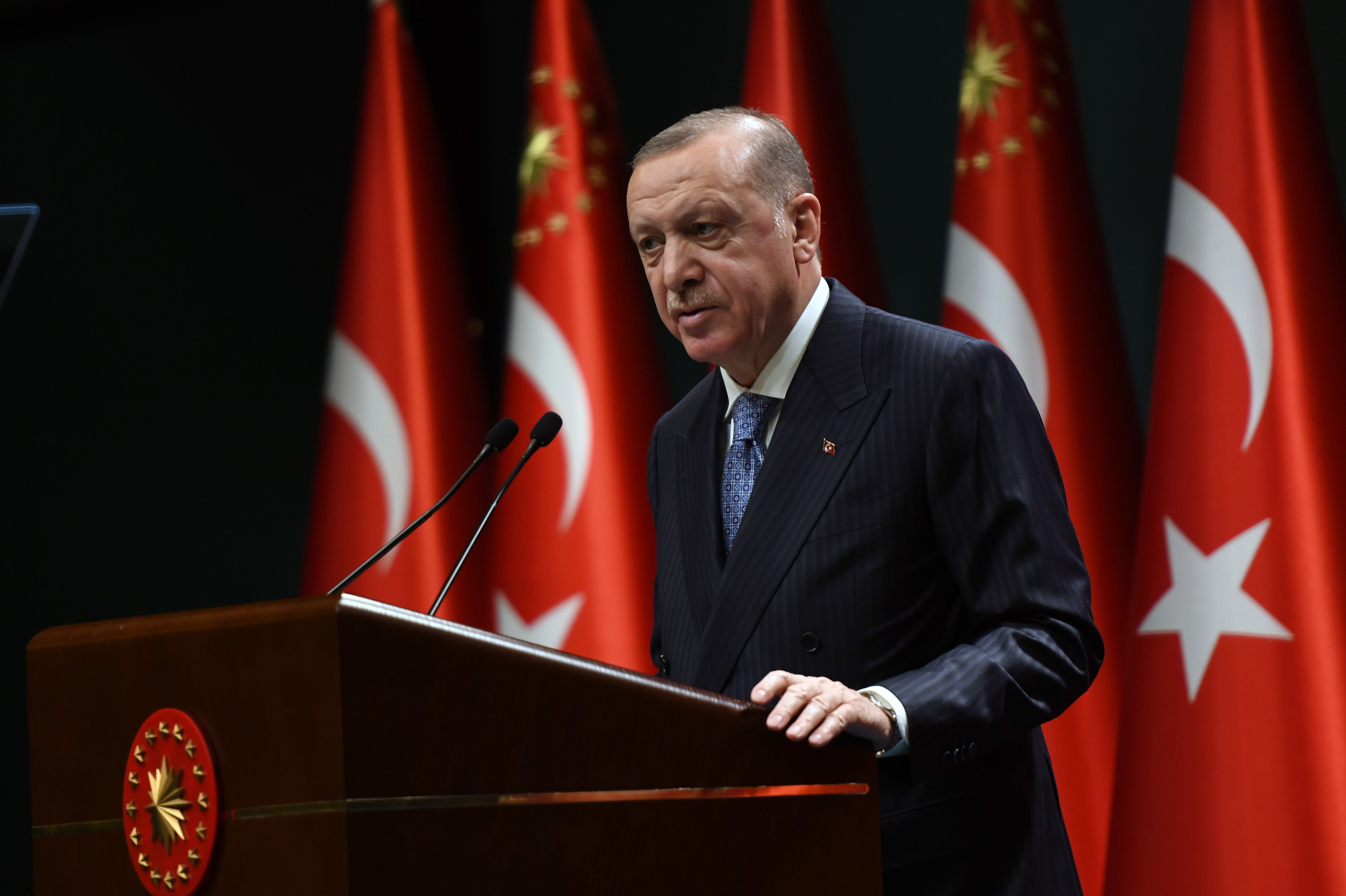Prospects for Turkey’s Policy Towards the South Caucasus

Political Dimension
In its policy towards the South Caucasus, Turkey follows the assumptions of its “Asia Anew” initiative of 2019, which envisages deepening political, economic, and scientific cooperation with Asian countries. The Caucasus plays the role of a transit region in this strategy, enabling Turkey to become more involved in the Caspian region and Central Asia. From the Turkish point of view, the Caucasus is part of a larger area inhabited by Turkic nations (Azerbaijanis and North Caucasus nations), important for the policy of panturism and Turkish soft power (including cooperation in the Turkic Council, of which Azerbaijan—Turkey’s most important ally—is a member).
Increasing Turkey’s influence in the Caucasus, due to its participation in the peace process in Nagorno-Karabakh (NK), enables it to strengthen instruments of political pressure against Russia and Iran through developing transactional cooperation with them, for example, by entering into tactical alliances with them in other areas such as the conflicts in Syria and Libya. By engaging in the peace process in the NK and its alliance with Azerbaijan, Turkey has brought its military infrastructure closer to Iran’s northern borders and increased the possibility of fuelling nationalist sentiments among the Iranian Azerbaijanis (around 15 million people, 16% of Iran’s population). As an opportunity to strengthen the means of influencing Russia, Turkey again (as in 2008) declares its willingness to normalise relations with Armenia, which is to be part of the peace process in the NK. Another instrument of political pressure on Russia is to support the principle of respecting the territorial integrity of the countries in the region. Turkey uses this principle to support Azerbaijan in its conflict with Russia’s ally, Armenia, over the NK. Thanks to it, Turkey also strengthens political influence in Georgia by supporting that state on the issue of separatism in Abkhazia and South Ossetia, occupied by Russia.
The Security Dimension
Military engagement has become the main instrument of pursuing policy in the South Caucasus for Turkey. Although Turkey did not participate in the conclusion of the agreement ending the fighting in the NK, on the basis of a separate agreement with Russia, Turkey participates in the peace process in the NK and the work of the Centre for Monitoring the Ceasefire in the NK, established on 31 January this year in Qiyameddinli, Azerbaijan. Turkey is striving to increase its role in the peace process in the NK (e.g., by protecting Azerbaijan’s borders in the NK) and to deepen military cooperation with Azerbaijan (intelligence cooperation, joint exercises, arms sales), including by building a military base on its territory. The base in Azerbaijan would create for Turkey new means of influencing the security situation in the Caspian Sea region and Central Asia, as well as additional instruments of pressure on Russia—and its ally Armenia—but also Iran. It would also strengthen Turkey’s allied guarantees towards Azerbaijan and enable greater assertiveness of both countries in relations with Russia, primarily in order to secure Azerbaijan’s interests in the NK. For Azerbaijan, on the other hand, the creation of a Turkish base on its territory would balance the influence of Russia, which has a military presence in all the countries of the Caucasus (including the base in Gyumri in Armenia, military installations in the separatist republics of Abkhazia and South Ossetia, peacekeeping posts in the NK).
The Economic Dimension
Relations with the countries of the South Caucasus are used by Turkey to increase its role as “a bridge between Europe and Asia”. Infrastructure projects, such as the Baku-Tbilisi-Kars railway, which are consolidating the Turkish-Azerbaijani alliance, are of key importance here. Unblocking transport routes in the Caucasus, one of the provisions of the agreement ending the fighting in the NK of 10 November 2020, will reduce the dependence of Turkey and Azerbaijan on transit through Georgian and Iran territories.
Turkey wants to strengthen the importance of the region in the Chinese Belt and Road Initiative (BRI) through China’s greater use of the BRI’s “central corridor” (via Central Asia, the Caspian Sea, the Caucasus, and Turkey), presented as a safer transport route to Europe than the rival northern (via Russia) and southern (via Iran) routes. However, these ambitions are limited by the reduced handling capacity of the “central corridor” and the prospect of less Chinese investments in BRI as a consequence of the COVID-19 pandemic.
The priority of Turkey’s policy towards the Caucasus is the development of infrastructure enabling the re-export of energy resources to Europe, such as the Baku-Tbilisi-Ceyhan oil pipeline and the Southern Gas Corridor (SGC). SGC enables the export of 10 billion m3 (bcm) of natural gas to Europe and 6 bcm to the Turkish market from the Azerbaijani Shah Deniz fields in the Caspian Sea, through a system of three interconnected gas pipelines—South Caucasus (Azerbaijan-Georgia-Turkey), Trans-Anatolian (via Turkey), and Trans-Adriatic (Turkey-Greece-Albania-Italy). Turkey is interested in expanding the SGC, doubling its capacity, and participating in the exploitation of deposits in the Caspian Sea, which are the raw material base for the SGC. Therefore, Turkey politically supports the declaration of Azerbaijan and Turkmenistan of 21 January this year on joint exploitation of the Dostluk gas fields.
Conclusions
Thanks to military involvement in the South Caucasus and its alliance with Azerbaijan, Turkey has become a country without which stabilisation of the region is impossible. Turkey will use its influence in the Caucasus in its policy towards both Russia and the EU, trying to reap immediate benefits from cooperation with both sides. Turkey will probably increase political pressure on the EU by taking advantage of the situation in the Caucasus, which is part of the Eastern Partnership for the EU. In this way, Turkey will force the EU to make concessions in other areas important for Turkish foreign policy in which Turkey and EU countries may have conflicting interests (e.g., in terms of obtaining support from Western allies for Turkish actions in Syria’s Idlib). To this end, Turkey will create with Russia—which has used the conflict over the NK to strengthen its influence and maintain its role of the main mediator—consultation formats regarding the security situation in the region, excluding the participation of EU states and limiting Union policy instruments in the Caucasus. An example is the “3+3” format proposed by President Recep Tayyip Erdoğan with the participation of Turkey, Russia, Iran and three countries of the Caucasus, similar to the Astana Process in Syria.
In view of the limited possibilities of the EU to independently influence the security situation in the Caucasus, the effectiveness of Union policy in this region will largely depend on the current state of EU-Turkish relations. Currently, bilateral relations are strained due to Turkey’s policy towards the Eastern Mediterranean, Cyprus, Syria, and Libya. The EU has limited possibilities of putting pressure on Turkey in terms of its policy in the region, for example, through the conditionality of credit support for a possible expansion of the SGC or economic sanctions. A review of EU-Turkish relations, currently carried out in connection with a report on the future of the EU’s relations with Turkey being prepared by the EU High Representative for Foreign and Security Policy, should take into account the possibility of a Turkish permanent limitation of EU instruments towards the South Caucasus.
In the event of tensions in Turkish-Russian relations (e.g., due to Russia expanding the powers of the peacekeeping mission in the NK or extending its duration without Azerbaijan’s consent after 2025), Turkey may exert pressure on Russia by supporting EU-promoted peace solutions towards the NK. Such an opportunity would be possible, for example, to develop a new, modified mandate of the OSCE Minsk Group that would take into account the enhanced position of Turkey in the South Caucasus and ensure its participation in the group’s presidency. Poland, during the OSCE presidency in 2022, may, thanks to good bilateral relations with Turkey and the countries of the region, try to strengthen the competences of the field mission of the OSCE chairman’s representative for the conflict over the NK (this function is performed by a Pole, Andrzej Kasprzyk).


